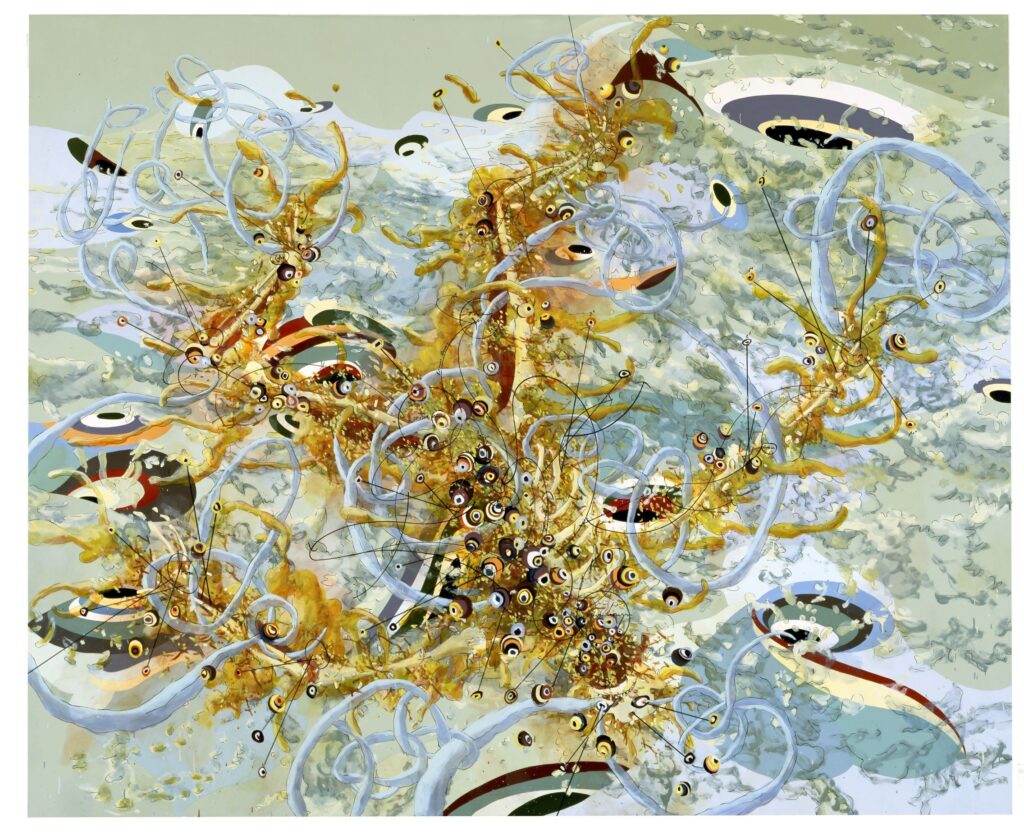
he Frist Art Museum presents Matthew Ritchie: A Garden in the Flood, a thematic survey of the artist’s work since 2000, comprising paintings, drawings, sculpture, and video. Organized by the Frist Art Museum, the exhibition will be on view in the Upper-Level Galleries from November 11, 2022 through March 5, 2023.
Matthew Ritchie is an internationally recognized artist who has exhibited at major museums around the world including the Guggenheim, the Museum of Modern Art, and the Whitney Museum of American Art; his works were also featured in the 2018 Frist Art Museum exhibition Chaos and Awe: Painting for the 21st Century. A pioneer in integrating disciplines and combining mediums, Ritchie has created deeply symbolic and dynamic installations that often involve architects, dancers, musicians, and other creatives. “This exhibition is ideal for a creative city like Nashville, with its ingrained and enduring tradition of interdisciplinary artistic collaborations,” said Frist Art Museum chief curator Mark Scala. In a recording that provides the sound bed for the exhibition and accompanies Ritchie’s new film Telmun, the Grammy Award–winning Fisk Jubilee Singers perform specially commissioned music by the acclaimed composer Hanna Benn.
“Ritchie’s works show inner and outer space converging in vistas of black holes and particle clouds, organic mutations and human phantasms, sacred music and scorched cityscapes,” said Scala. Teeming with luminous colors, surreal forms, and evocative symbols, they are efforts to visualize the deep human desire to develop “theories of everything” in fields as diverse as literature, mythology, philosophy, science, and technology.
Though his attempts to depict abstract, invisible forces are often rooted in complex theory, Ritchie’s art can be appreciated on a strictly aesthetic level. He writes, “Information is itself a material, just like paint, music, or film. All my works can be fully experienced without reading a single text. But like the tales of Scheherazade in One Thousand and One Nights, or a multiverse like the Marvel Universe, there are stories within stories here—should you choose to explore them.”
A Garden in the Flood begins with a selection of paintings from throughout Ritchie’s career, including M Theory (2000), The Eighth Sea (2002), and Morning War (2008), that introduce his visual vocabulary of writhing and dissolving forms and figures, dramatic compositions, diagrams, and pictographs. This imagery then unfolds in architectural structures like The Dawn Line (Weather Eye Variant) (2022), vast wall drawings, and hallucinatory animations, including some formed using artificial intelligence.
Woven throughout Ritchie’s work are the themes of garden and flood, paired symbols that evoke such opposites as harmony and chaos or the known and the mysterious. “While the garden may be a simulation of paradise, the flood might stand for the submergence of civilization by the forces of nature, a foundational myth told in many cultures around the world,” said Scala. “In this exhibition, the interchangeable metaphor extends to a broad view of history and culture, the overwhelming impact of technology, and the challenges and promises of an unknowable future.”
A large ten-channel multimedia installation titled The Arguments includes ten loosely connected films Ritchie created between the early 2000s and today. The title is a reference to John Milton’s Paradise Lost, in which each book begins with a philosophical premise or declaration called an “argument.” “The films take us on a journey through deep time, soaring and dipping through scenes of fires and floods, riots and ruins, worlds microscopic and macrocosmic,” said Scala. “The loss of paradise becomes a meditation on what we are losing now, and ultimately what we can gain as we shape the future.”
The most recent film, commissioned for this exhibition, is named Telmun (2022) in reference to a place near the Persian Gulf once believed to be the site of the Garden of Eden. It features the musical composition “A Garden in the Flood” by composer, vocalist, and genre-spanning collaborator Hanna Benn. The piece was performed for the film by the Fisk Jubilee Singers and their late director Dr. Paul T. Kwami, internationally celebrated for their repertoire of Black gospel and spirituals. Ritchie wrote the lyrics, and the visual elements include images of the Fisk Jubilee Singers, diagrams from W. E. B. Du Bois’s data portraits, and other free-flowing abstractions.
Programs such as the Frist’s Connecting Disciplines series, in which community experts speak about art in the context of specialized fields such as artificial intelligence, choral music, history, and quantum physics, will lead guests to experience the exhibition through new and surprising perspectives.
Source: Frist Art Museum, Oct 26, 2022
Located at 919 Broadway in downtown Nashville, Tenn., the Frist Art Museum offers the finest visual art from local, regional, national, and international sources in exhibitions that inspire people through art to look at their world in new ways.